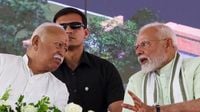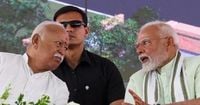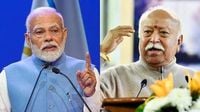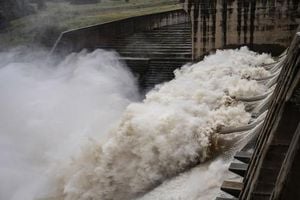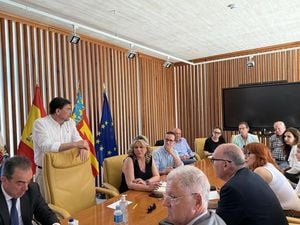In a significant political development, Prime Minister Narendra Modi met with Rashtriya Swayamsevak Sangh (RSS) chief Mohan Bhagwat on April 29, 2025, at his official residence in New Delhi. This meeting comes in the wake of the devastating Pahalgam terror attack that tragically claimed the lives of 26 civilians, primarily tourists, on April 22, 2025.
The meeting, which lasted over an hour, was part of a series of high-level discussions focused on national security and the government’s response to the recent attack attributed to Pakistan-linked terrorists. Union Home Minister Amit Shah was also present during the discussions, emphasizing the government's commitment to addressing the terror threat.
Sources indicate that the Prime Minister and Bhagwat exchanged views on the security situation in Kashmir, where the attack occurred, and deliberated on the necessary countermeasures. The RSS has been vocal in its condemnation of the attack, describing it as an assault on the unity and integrity of the nation. The organization called for a united front among all political parties to denounce the violence, urging that the government ensure relief for the affected families and deliver appropriate punishment to those responsible.
In a statement reflecting the seriousness of the situation, the RSS asserted, "All political parties and associations should rise above their differences and condemn this terror act. Government should ensure all required relief and assistance to the affected families and ensure appropriate punishment for the people responsible for this attack." This call for unity is particularly significant given the heightened tensions between India and Pakistan, especially following such a tragic event.
Earlier on the same day, Modi chaired an emergency meeting with key members of the defense establishment, including Defence Minister Rajnath Singh, National Security Advisor Ajit Doval, and Chief of Defence Staff General Anil Chauhan, along with the chiefs of the Army, Navy, and Air Force. During this meeting, Modi reiterated India's strong stance against terrorism, expressing full confidence in the armed forces and granting them complete operational freedom to determine the mode, targets, and timing of any retaliatory actions.
The Prime Minister’s directive to the military reflects a significant shift in India’s approach to counter-terrorism, particularly in light of the Pahalgam incident. He stated, "They have complete operational freedom to decide on the mode, targets and timing of our response," underscoring the government's resolve to deliver a decisive blow to terrorism.
The Pahalgam attack, which involved five to six terrorists from the Pakistan-based group Lashkar-e-Taiba, was not only a tragic loss of life but also a potential setback for the region's ongoing recovery from years of conflict. Experts warn that such violence could disrupt the fragile economic revival in Kashmir, particularly in the tourism sector, which had begun to show signs of progress after years of hardship.
Bhagwat, during a public event prior to the meeting, expressed the pain and anger felt by many in the nation, emphasizing the need for a strong response to such acts of terror. He remarked, "We hope for a strong response. People were killed after being asked about their religion. Hindus would never do such a thing. There is pain in our hearts. We are angry." This sentiment resonates deeply within the broader community, calling for a resolute stance against terrorism.
The RSS chief further articulated the moral obligation of the government to protect its citizens, stating, "It is the duty of the king to protect his people. The king must perform his duty. Teaching hooligans a lesson is also part of the duty." This statement highlights the expectations placed on the government to act decisively in the face of such provocations.
The meeting between Modi and Bhagwat, while significant in its timing, is also noteworthy as such interactions occur infrequently. The RSS, considered the ideological backbone of the ruling Bharatiya Janata Party (BJP), has a substantial influence on national policy, particularly regarding issues of national security and Hindu nationalism.
In the aftermath of the Pahalgam attack, the Indian government has also indicated a potential shift in its diplomatic stance towards Pakistan, including reconsidering the Indus Water Treaty as a response to cross-border terrorism. This move signals a broader strategy to hold Pakistan accountable for its alleged support of terrorism.
As India navigates these turbulent waters, the government has called for an all-party meeting to unify political factions in support of any necessary actions against the perpetrators of the Pahalgam attack. Opposition parties have expressed their willingness to back the government's initiatives, emphasizing the need for a cohesive national response.
The Pahalgam attack serves as a stark reminder of the ongoing challenges faced by India in its fight against terrorism and the delicate balance required to maintain peace and stability in the region. As the situation evolves, the government's response will likely be closely scrutinized both domestically and internationally.
In conclusion, the meeting between Prime Minister Modi and RSS chief Bhagwat underscores the urgency and gravity of the current security situation in India, particularly in the context of Kashmir. With the nation united in its condemnation of terrorism, the government's forthcoming actions will be pivotal in shaping the future landscape of security and diplomacy in the region.
